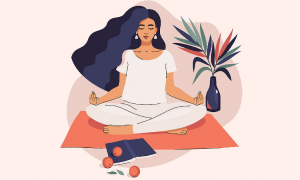Stress management can be greatly aided by relaxation practices which ultimately helps in improving mental health. Peace of mind or engaging in a hobby are merely two aspects of relaxation. It is a method that lessens the negative effects of stress on your body and mind. Utilising relaxation techniques can help you manage daily stress. Additionally, these methods can help with chronic stress or stress connected to different medical issues, like heart disease and pain.
Learning relaxation techniques can help you, regardless of whether your stress is under control or is out of control. Simple relaxation methods are simple to learn. Relaxation techniques may often be used anywhere, are frequently free or inexpensive, and carry little danger. Investigate easy relaxing methods to reduce stress in your life and enhance your health and general wellbeing.
The advantages of relaxing methods
Relaxation methods may not be a top priority in your life when you are dealing with a lot of obligations and tasks or the demands of a disease. However, that means you might miss out on the advantages of relaxation for your health.
Relaxation exercises have a variety of advantages, including:
reduced heart rate
Bringing down blood pressure
breathing more slowly enhancing digestion
Keeping blood sugar under control
lowering stress hormone activity
expanding the blood supply to the main muscles
lowering persistent pain and muscle stiffness
Enhancing mood and concentration Improving sleep quality
reducing tiredness
Reducing rage and irritation
Increasing self-assurance to solve issues
Use relaxation techniques in addition to other healthy coping mechanisms, such as:
Positive attitude
Finding humour and resolving issues
Time and priority management
Regular exercise and a nutritious diet
Getting enough rest Being active in nature
contacting sympathetic family and friends
various relaxing methods
Numerous relaxation techniques can be taught by healthcare professionals like mental health practitioners and complementary and integrative health specialists. However, you can also educate yourself on some relaxation methods.
Redirecting your attention to something calming and becoming more conscious of your body are two general components of relaxation techniques. Which relaxation method you pick is irrelevant. It’s important to make an effort to relax frequently if you want to experience its benefits.
There are various relaxation methods, such as:
Autogenic Relaxation
relaxing on one’s alone. Autogenic refers to something that originates within of you. You can lower tension by using this relaxation technique, which combines body awareness with visual images.
You mentally repeat phrases or ideas that can ease tension in your muscles and promote relaxation. For instance, picture a calm environment. Following that, your attention can be directed towards relaxing your breathing, lowering your heart rate, or experiencing various bodily sensations, such as relaxing each arm or leg one at a time.
Muscle Relaxation Technique
muscular relaxation in stages. You concentrate on gradually tensing and then releasing each muscle group when using this relaxation technique.
Your ability to distinguish between muscle tension and relaxation will be aided by this. Physical experiences can help you become more conscious.
One technique for progressive muscle relaxation involves starting with your toes and gradually working your way up to your neck and head. The ideal setting for doing this is a peaceful, distraction-free environment. Alternately, you could start at your head and neck and work your way down to your toes. Repeat by making your muscles tense for five seconds, then relax for thirty.
Visualization.
You could create mental pictures as part of this relaxation technique to transport yourself to a tranquil, serene location or circumstance.
Include as many senses as you can when using visualisation to decompress, such as smell, sight, sound, and touch. Consider the aroma of salt water, the sound of breaking waves, and the warmth of the sun when you picture yourself unwinding at the beach, for example.
Close your eyes, find a peaceful place to relax, take off any tight clothing, and concentrate on your breathing. Try to keep your mind on the here and now and to think positively.
Other methods of relaxation could be:
breathing deeply Massage meditation
Yoga and Tai chi biofeedback
art and music therapy
Aromatherapy
Hydrotherapy
Why Caring for Yourself Is Important for Your Wellness in General
We all lead busy lives, and it can be simple to put other obligations ahead of our personal needs. However, when it comes to overall wellness, caring for yourself should come first.
Self-care has several physical advantages that improve your general health and well-being. Here are a few illustrations:
Improved Sleep: You can get better quality sleep by using self-care techniques like creating a bedtime ritual, having a warm bath before bed, or engaging in calming activities just before bed. The body needs adequate sleep to repair and regenerate, to enhance cognitive function, and to strengthen the immune system.
Reduced Risk of Illness: Self-care activities like regular exercise, a nutritious diet, and adequate rest help strengthen your immune system and lower your risk of contracting diseases including heart disease, diabetes, and some cancers.
Increased Energy: You can notice an increase in energy when you prioritise your personal needs and partake in enjoyable and relaxing activities. You may feel more inspired and productive as a result all day long.
Reduced Stress: Prolonged stress might harm your physical well-being. Self-care activities like yoga, meditation, or time spent in nature can help lower blood pressure, minimise stress levels, and enhance cardiovascular health.
In general, taking care of yourself can significantly benefit your physical health and raise your quality of life. You may improve your well-being and avert future health issues by scheduling self-care activities.
Benefits of Self care on Mental Health
Self-care can also have a big impact on your mental health. The following are a few advantages of self-care for the mind:
Reduced Anxiety and Depression: Self-care activities like deep breathing exercises, meditation, or time spent in nature can all help to lessen anxiety and depressive symptoms. These techniques can assist you in de-stressing and calming your mind, which will help you experience less anxiety and depressive symptoms.
Enhanced Mood: Taking part in enjoyable and relaxing activities, like reading a book, listening to music, or spending time with loved ones, can elevate your mood and general sense of wellbeing. By increasing the release of feel-good hormones like endorphins, these activities can improve mood and relieve stress.
Self-care routines can help you develop resilience, which is the capacity to deal with stress and challenging circumstances. You may improve your emotional control, develop your self-awareness, and strengthen your sense of resilience so that you are more equipped to handle the obstacles life throws at you.
Improved Cognitive performance: Long-term stress can affect memory and concentration as well as general cognitive performance. Exercise, enough sleep, and mindfulness meditation are all self-care activities that can enhance cognitive performance and increase mental clarity.
In general, self-care is necessary to preserve excellent mental health. You can lower stress, boost mood, and develop resilience by putting your needs first and practicing self-care.
The importance of self-care can also have a big impact on mental health. You can lessen anxiety and despair and lift your mood by participating in enjoyable and relaxing activities. Self-care techniques for mental health include things like meditation, being outside, and engaging in happy activities.
Mindfulness as self-care
Self-care methods like mindfulness can help us control our thoughts more effectively. With the help of these methods, we can take care of ourselves even when we are really busy.
Nowadays, ‘mindfulness’ is a term that many people have heard of, and you may already have tried a mindfulness practice like meditation.
One of mindfulness’ main advantages is that it lowers stress levels, particularly when you’re working.
Scheduling, completing projects, working with many people, and other factors that contribute to juggling work and life can be difficult. Yes, ongoing stress at work is unavoidable.
Thus, practising mindfulness enables one to let go of stress and develop tremendous resilience.
In the end, practising mindfulness won’t make you empty your mind or stop thinking. Instead, practising mindfulness will encourage you to pay more attention to your body’s physical sensations, organise and focus your thoughts and emotions, more effectively analyse your thoughts, and foster creative thought.
Given that mindfulness has so many advantages, it is crucial to have it in your career, regardless of your industry! Although mindfulness presents many opportunities for growth, the rewards are immeasurable. Not only will you function really effectively in your career as you work to include mindfulness, but your coworkers, clients, CEOs, etc. will undoubtedly applaud you for it.
Conclusion
Relaxation and self-care are a crucial components of overall wellbeing. Including self-care and relaxation techniques in your daily routine can have many positive effects on your physical and mental health, including a decrease in stress and anxiety, an increase in resilience and self-worth, better interpersonal connections, and better physical health. You may establish a solid self-care routine that promotes your general health and wellbeing by assessing your needs, setting aside time for self-care, practising mindfulness, setting boundaries, being grateful, and asking for help when you need it. Keep in mind that caring for oneself is not selfish; it is essential. Make self-care a priority and include it into your everyday routine.























